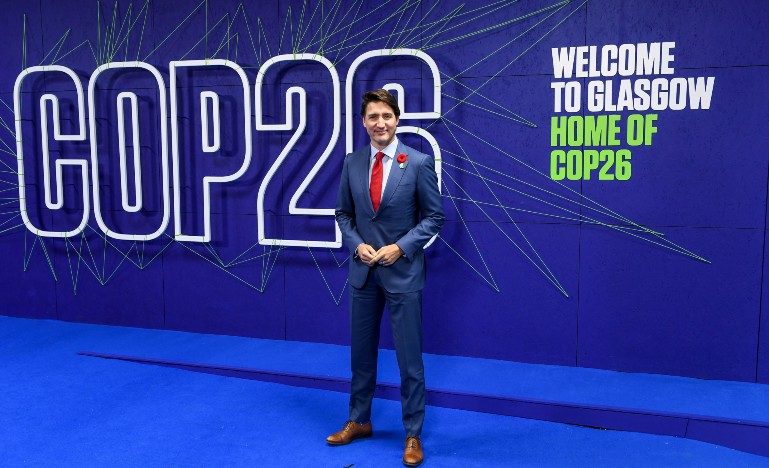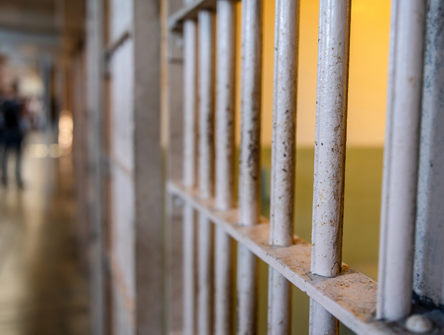Pledges upon pledges
To hold the government's feet to the fire on climate action, we need enforceable rules.

In the wake of a slew of speeches, declarations and announcements at COP26 in Glasgow last month, Canada came away from the global climate summit having made a considerable list of commitments.
Among them was a call for a global carbon tax, a promise to impose a cap on oil and gas sector emissions, a recommitment to reduce methane emissions, a promise to end the public financing of international fossil fuel projects, and a declaration to halt and reverse deforestation.
But how much of it is legally enforceable given there's nothing within the United Nations Framework Convention on Climate Change process, or in international law, that mandates action on these obligations?
"The short answer is that the Glasgow Declaration and the side agreements, none of them are framed as legally binding," says Dianne Saxe, an environmental lawyer with Saxe Facts and former environmental commissioner of Ontario.
"There are no official consequences for not following through. There is no enforcement body. These are promises that nations make to each other."
Over the years, Saxe says, most of the promises made at global climate talks have been broken. Canada's track record is abysmal, something the country's environmental watchdog blasted the federal government over recently after releasing a report documenting three decades of failing to turn emissions-cutting talk into action.
"Canada was once a leader in the fight against climate change. However, after a series of missed opportunities, it has become the worst performer of all G7 nations since the landmark Paris Agreement on climate change was adopted in 2015," Commissioner of the Environment and Sustainable Development Jerry DeMarco said in a media statement. "We can't continue to go from failure to failure; we need action and results, not just more targets and plans." However, DeMarco still has hope Canada can break its streak of "unfulfilled promises."
Saxe finds hope harder to come by. "[Minister of Environment] Steven Guilbeault knows what's at stake and what has to be done, but it's hard to have much optimism about the federal government implementing these things."
She points to Canada signing a declaration in Glasgow to "halt and reverse forest loss and land degradation by 2030. "It's not the first pledge of its kind Canada has made. We signed the New York Declaration of Forests in 2014." In the years since, there's been a 40 per cent increase in deforestation.
Canada also committed to ending international fossil fuel subsidies by the end of 2022, and to support a transition to clean energy.
"I think we have signed at least four international commitments to do that — three that said we'd phase it out, now we've got one that says we'll phase it down — without doing it," says Saxe, who is also the deputy leader of the Green Party of Ontario. "We have a really long record of making all kinds of promises that we don't keep."
An analysis by the International Energy Agency found that the COP26 pledges could keep global warming below 2 degrees Celsius, which is a key Paris Agreement goal. But that's contingent on them being implemented. Given what countries announced they'll do, a projected increase of 2.6 C is more likely.
Alan Andrews, climate program director with Ecojustice, Canada's largest environmental law charity, says given the current state of geopolitics, there was some solid progress made in some important areas at COP26. But he finds it difficult to be too optimistic given the 2.6 C projection and the fact he returned home to British Columbia to find the epicentre of the climate crisis on his doorstep and large swaths of the province underwater.
He says organizations like Ecojustice have a critical role to play in holding the government's feet to the fire. Ideally, getting them to follow through on their commitments comes through legislation or regulations.
"That ensures that you have not just a robust, democratic process leading up to those rules, but that they're also enforceable through the courts if they're not complied with," Andrews says.
"Our hope is that as many of these commitments as possible are given effect through legislation, and the courts are really a last resort. We'd hope that with a government that is at least claiming to want to lead on climate change, we'll be able to see more progress through legislation and less through the courts."
He points to the work done, including by Ecojustice, to pass Bill C-12 earlier this year, which created a climate accountability framework. While not as strong as similar legislation in other countries, the Canadian Net-Zero Emissions Accountability Act improves transparency and consistency around climate action to gauge efforts to meet emissions reduction targets.
"We now at least have legislated targets and a robust process which allows us to hold governments to account," Andrews says.
"It's too early to tell if that will work, as the ink is barely dry on that piece of legislation. But we hope it will at least shine a bit more accountability on government action, and that we will see progress towards Canada's targets."
For her part, Saxe expects efforts to implement many of the COP26 commitments will lead to the courts.
"The federal government has made these promises on behalf of Canada, but their authority is limited. A lot of the things that need to be done are under the jurisdiction of the provinces. Most of the emissions in Canada come from Alberta and Ontario. Ottawa will be really hampered by their right-wing governments that seem to consistently do exactly the opposite of what we need to do, which is why we end up with litigation."
Any effort to curb oil and gas emissions will undoubtedly end up in court, she says.
"We have (Premier Jason) Kenney positioning himself. His only reason for existing is to attack the federal government and to defend the oil industry. We don't see any effort from him to transition his province."
Andrews says there's no question the federal government will face considerable headwinds from the fossil fuel-dominated provinces in any effort to cap oil and gas emissions.
"But ultimately, there is only so much those provinces can do to oppose federal action," he says. "The carbon pricing reference case at the Supreme Court at least clarified that the feds have jurisdiction to set prices on carbon. There are various other legal levers the federal government can pull that are within their jurisdiction."
Saxe says if the Trudeau government dangles enough money in front of Kenney, he might be open to negotiating.
"But if the prime minister doesn't get it with a chequebook of our money, his only other option is to try through regulation," she says. "Then he's going to be back in front of the courts because the arguments that were used to justify The Greenhouse Gas Pollution Pricing Act are not the same as what he would need to justify putting a cap on emissions from the oil sands if he's not putting a cap on anything else."
Andrews says that's why the Just Transition Act the government promised in 2019, but has yet to table, is critical in the move to a low-carbon economy.
"We want to see that the transition that needs to happen rapidly happens in a way that doesn't lead to significant hardship for those in affected communities, and that the benefits of the transition are shared throughout Canada," he says. "That's critically important."
Ultimately, it may serve to flatten somewhat what will be a significant uphill battle to make good on at least one of the COP26 promises this country has made.

.png?ext=.png)
